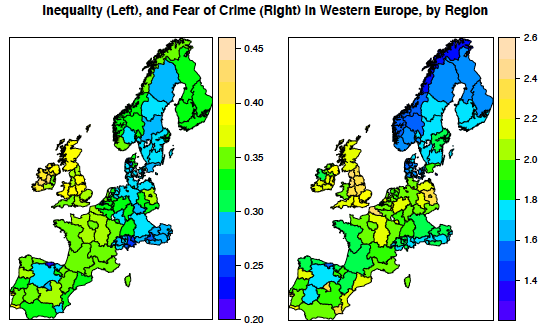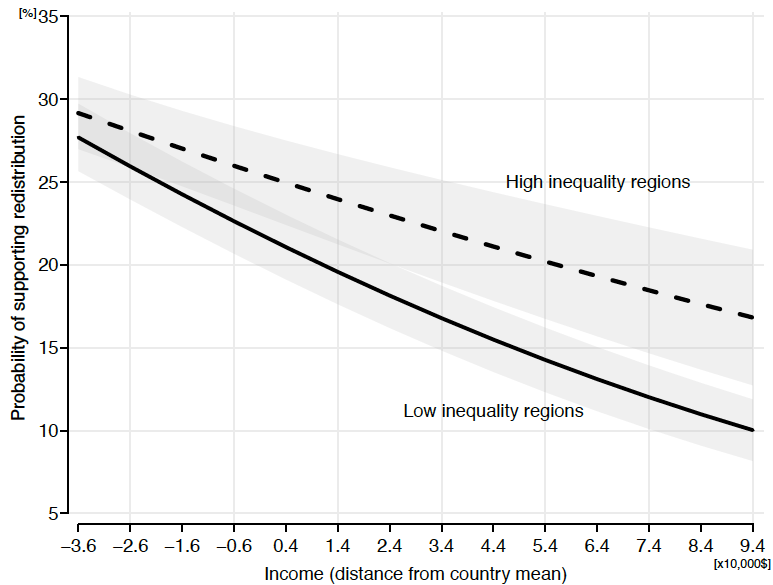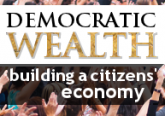The forthcoming article in the American Journal of Political Science “The Externalities of Inequality: Fear of Crime and Preferences for Redistribution in Western Europe” by David Rueda and Daniel Stegmueller is summarized by the authors here:
Many politicians would agree that an individual’s relative income (i.e., whether she is rich or poor) affects her political behavior. Income differentials and the increase in inequality experienced in the recent past have become an important part of electoral politics in most industrialized democracies. If income matters to individual political behavior, it seems reasonable to assume that it does so through its influence on individual preferences for redistribution. The relationship between income inequality and redistribution preferences, however, is a hotly contested topic in the comparative political economy literature (and also in other fields like economics, as attested by the reactions to Thomas Piketty’s Capital in the Twenty-First Century).
In this article, we show that the difference in redistribution preferences between the rich and the poor is high in some regions and low in others and we argue that this has a lot to do with the rich and very little to do with the poor. We propose that while there is a general relative income effect on redistribution preferences, the preferences of the rich are highly dependent on the macrolevel of inequality. Our main findings can be summarized very simply in the following figure.
The figure captures the relationship between income (on the x-axis) and redistribution preferences (on the y-axis) in regions with high or low levels of inequality. The figure makes clear three distinct points. First, whatever the level of inequality, there is a relative income effect: the rich support redistribution less than the poor. Second, whatever the level of inequality, the poor’s support for redistribution is high (the difference between their preferences in low and high inequality regions is not significant). And third, the rich are more likely to support redistribution in regions with high levels of inequality.
This is not a necessarily intuitive set of findings, and we spend the first half of the article explaining the theoretical reasons behind these relationships. Our argument consists of (once again) three main elements. The first one is that the level of redistribution preferred by a given individual is fundamentally a function of current income (since redistribution benefits the poor and is paid for by the rich). The second point distinguishes between current tax and transfer considerations and externality-related motivations, and it maintains these motivations are long term and low stakes. As such, they matter most to the rich. We argue that, if we accept that the influence of current tax and transfer considerations is sufficiently captured by the micro effect of relative income, macrolevels of inequality will matter to the rich—and only to the rich—because of negative externality reasons. Our third point proposes that this conditional effect of inequality can be explained by different microfactors and contends that the most important of these is concern for crime, as a most visible negative externality of inequality.
We test our hypotheses with data from the European Social Survey (ESS), which includes consistent regional-level identifiers allowing us to match individual and regional information while working with adequate sample sizes. In the article, we first present a set of illustrative graphs about the factors that this article’s argument is about: the existence of regional variation in support for redistribution among the rich and among the poor, the regional patters of inequality and fear of crime, etc. We then develop a more systematic two-stage approach. In the first stage of our analysis, we study the link between inequality, relative income, and redistribution preferences. In the second stage, we jointly model preferences for redistribution and fear of crime. And we present a large number of robustness tests addressing alternative model specifications (in the text and the on-line appendices)!
We believe the arguments in this article challenge some influential approaches to the politics of inequality. These range from those contending that second-dimension issues (particularly cultural and social ones) outweigh economic ones to those emphasizing insurance concerns, social affinity, or prospects of upward mobility. And we hope that the arguments in this article clarify the role of preferences as an essential first step for an accurate understanding of redistribution.









No Comment